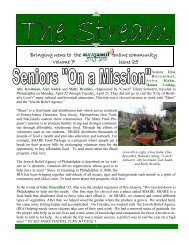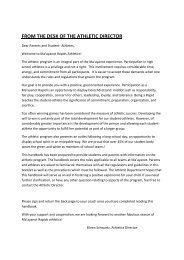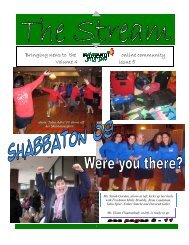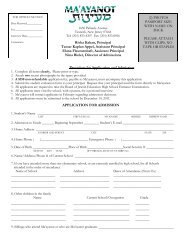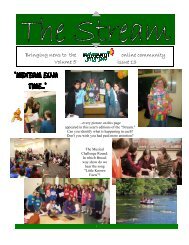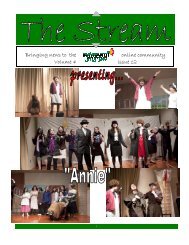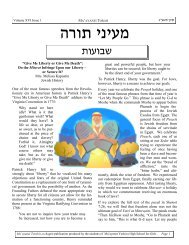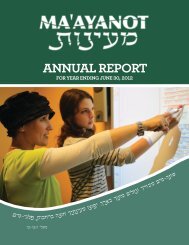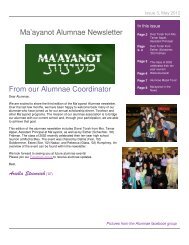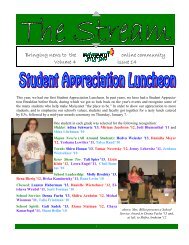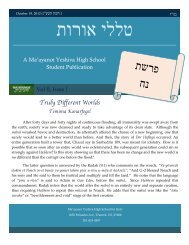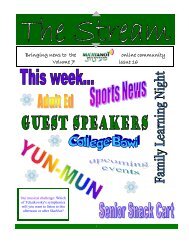Issue 1 - Ma'ayanot Yeshiva High School for Girls
Issue 1 - Ma'ayanot Yeshiva High School for Girls
Issue 1 - Ma'ayanot Yeshiva High School for Girls
You also want an ePaper? Increase the reach of your titles
YUMPU automatically turns print PDFs into web optimized ePapers that Google loves.
“The Stream“ August 30, 2013/24 Elul 5773<br />
Teachers Teaching Teachers<br />
Playing Hard in the Summer Sandbox-by Mrs. Leah Herzog, Tanakh Faculty and Israel Guidance<br />
For three days in July, Ma’ayanot hosted a new kind of professional development program called The<br />
Summer Sandbox. The Sandbox was the brainchild of Mrs. Tikvah Wiener, coordinator of interdisciplinary<br />
studies, chairman of the English department at The Frisch <strong>School</strong> and a founding member of JED-<br />
LAB, which is a Facebook group comprised of and open to all the partners in Jewish education engaged in<br />
an ongoing, bottom-up ef<strong>for</strong>t to improve all kinds of Jewish education.<br />
I found out about the Sandbox from Mrs. Weiner, through JEDLAB and through an email that was sent to<br />
Ma’ayanot faculty by Mrs. Pam Ennis. This was to be an “un-workshop”: there was no keynote and no<br />
workshops to choose from. Instead, we learned together—through discussion and debate, through Skype<br />
and through demonstration by experienced practitioners. It was a place to “play hard”—to learn a great<br />
deal and to have fun doing it.<br />
I was joined in the Sandbox by Mrs. Pam Ennis, Ma’ayanot’s Director of Community Relations, and by<br />
Mrs. Becky Katz of our Math Department, and by almost 20 other people from the tri-state area and beyond<br />
(as far away as Florida!). Our group was religiously pluralistic, and comprised of people from day<br />
schools, supplemental schools, Jewish communal work and philanthropy. Tikvah Wiener, together with<br />
Akiva Mattenson and Peninah Warburg, both 2013 graduates of Frisch, organized and largely facilitated<br />
the three-day event; nevertheless, with the exception of a few previously-organized sessions, what we<br />
learned was left to us. The goal was both amorphous and exiting: at the end of the three days, each of us<br />
was to complete a “project” that we would share with the group and, hopefully, with our students or parents<br />
or schools or communities. We would choose the project based on our passions and needs. I chose to<br />
re-frame and revise the curriculum <strong>for</strong> the study of Devarim, part of our Grade 12 Bible class. I also<br />
worked on ways to integrate more PBL (Project Based Learning) into units I teach in grades 9 and 12.<br />
We worked how and where we wanted: in pairs, trios, solo, even at home (as I did <strong>for</strong> one afternoon). We<br />
were able to stay in whatever “configuration” we were in, or to collaborate with other individuals and<br />
groups at other times. Ideas and expertise where shared freely and fertilized the soil to grow new perspectives.<br />
Lunch was designed to be more “coffeehouse meetup” than just a time to eat. There was paper on<br />
the tables so we could sketch or jot ideas down as they came to us. Over three days, in a style that definitely<br />
resembled the Beit Midrash, we learned together about the MIT Media Lab’s model of “serendipity<br />
by design” and “hard play” and “fail fast to fail <strong>for</strong>ward,” about student-driven and inquiry-based learning,<br />
and about project-based learning. We talked about the needs <strong>for</strong> digital citizenship, and debated the competing<br />
models of 21 st Century education. We spent three days deeply engaged in thinking about and working<br />
on education.<br />
Each of us walked away with something unique and personal, and each of us left with ideas, projects or<br />
goals to work on during the upcoming year. It was invigorating and exciting; since teachers are perpetual<br />
students, it was a great place to play! To read an article about the “Sandbox” which appeared in the Jewish<br />
Standard this summer, click here.<br />
Professional Development <strong>for</strong> our faculty is coordinated by Mrs. Shifra Schapiro of our Tanakh Department<br />
and Mrs. Merav Tal-Timen, Ivrit Chair. In addition to arranging monthly “Lunch and Learn” programs<br />
<strong>for</strong> faculty, Mrs. Schapiro and Mrs. Tal-Timen are working with faculty this year to develop opportunities<br />
<strong>for</strong> Professional Learning Communities (PLC). PLC's are interdepartmental, created based on<br />
teacher interest, and meant to encourage teacher reflection and experimentation with techniques learned<br />
through collaboration with colleagues.<br />
9<br />
(Continued on page 10)



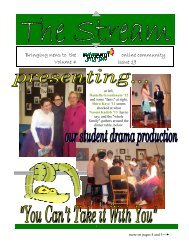
![Issue 18].pub - Ma'ayanot Yeshiva High School for Girls](https://img.yumpu.com/48719735/1/190x245/issue-18pub-maayanot-yeshiva-high-school-for-girls.jpg?quality=85)
